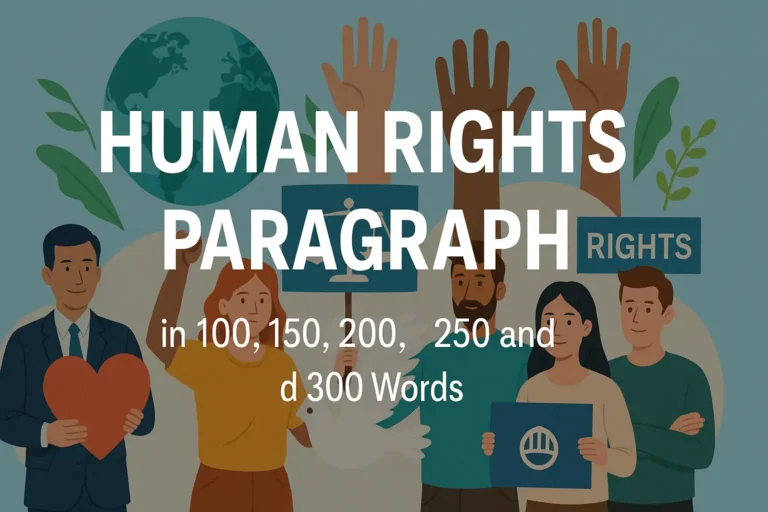Diaspora Paragraph for Class 4 to HSC
Many students often face confusion when writing a clear and complete paragraph on “Diaspora.” To help with that, this content explains the topic in a simple and meaningful way.
It covers all the key points students need to know and is written to match exam needs and real-life understanding.
In this paragraph, we have tried to answering/ covering this following questions:
- What is diaspora?
- Why do people form a diaspora?
- Where do diaspora communities live?
- How do they keep cultural ties?
- What challenges do they face?
- How do they impact their homeland?
- What benefits do they bring to host countries?
- How large are some famous diasporas?
Paragraph on Diaspora for Class 4-5 (in Easy Word)
Diaspora means people who live outside their homeland for a long time. They often move for jobs, education, or safety. Some leave because of war, poverty, or natural disasters.
Diaspora communities live in cities and stay connected to their culture. They speak their language, eat traditional food, and celebrate festivals. Life in a new country is not always easy. They may face racism, language problems, or loneliness.
Still, diasporas help their home country by sending money and ideas. They also help host countries by working hard and sharing culture. Indian and Chinese diasporas are two of the largest in the world.
Diaspora Paragraph for Class 6-7 (150 Words)
Diaspora means a group of people who leave their homeland and live in other countries. People form a diaspora for many reasons like war, poverty, education, or jobs. Sometimes they leave to stay safe or find a better life.
Diaspora communities can be found all over the world. They often live together in big cities to feel at home. They open shops, schools, or religious centers to stay close to their culture.
They speak their language at home and celebrate their festivals. This helps them stay connected with their roots. Many also send money back to help their families.
But living far from home is not always easy. They may face racism, language problems, or feel lonely. Even so, diasporas help their homeland by sending money and sharing ideas.
They also help their new countries by working hard and bringing new skills. The Indian, Chinese, and Jewish diasporas are some of the largest in the world today.
Bangladeshi Diaspora Paragraph in 200 Words (for Class 8)
Diaspora means a group of people who live outside their original country for a long time. People often leave their homeland for better jobs, education, safety, or family needs. Sometimes, war, natural disasters, or political problems force them to leave.
These people build new lives in other countries but try to stay close to their own culture. They often live together in the same areas or neighborhoods. Many open their own shops, schools, or religious places to feel at home.
Diaspora communities keep their culture alive by speaking their native language, cooking traditional food, and celebrating festivals. They also teach their children about their roots. Even from far away, they send money to their families and help their hometowns.
However, life in a foreign land is not always easy. They may face racism, language barriers, and identity struggles. Some feel alone or disconnected from both their new home and their old one.
Despite these issues, diasporas play a big role in both countries. They help the host country by working hard, paying taxes, and bringing new skills. At the same time, they support their homeland with ideas and money.
Some of the largest diaspora groups are Indian, Chinese, and Jewish diasporas. Each has millions of members across the world.
Diaspora Paragraph for SSC/ 9-10 (250 Words)
Diaspora means a group of people who leave their homeland and settle in other countries for a long time. This can happen for many reasons. Some people move for better jobs, education, or safety. Others leave because of war, poverty, or political problems in their home country.
Diaspora communities are found all over the world. They often live in cities where they can find work and meet others from their country. These communities help each other to feel at home in a new place.
Even though they live far away, they try to stay close to their culture. They speak their native language at home, celebrate festivals, and follow traditions. Many teach their children about their history and customs.
However, life in another country is not always easy. People in a diaspora may face racism, cultural differences, or language problems. They may also feel homesick or lost between two cultures.
Still, diasporas play an important role for both countries. They send money to their families, which helps the economy of their homeland. They also share new ideas, skills, and experiences with their home country.
At the same time, host countries also benefit from diaspora communities. They bring hard work, new businesses, and cultural diversity. They help fill jobs and support economic growth.
Some of the largest diasporas in the world include the Indian, Chinese, and Jewish communities. These groups have millions of members living in different countries. They are strong examples of how people can live far away but still stay connected to their roots.
Diaspora Paragraph for HSC (300 Words)
The word “diaspora” means the movement of people from their original homeland to live in other countries. These people may move to find better jobs, higher education, or safety from war and natural disasters. Over time, they form communities in foreign lands, but they still hold strong connections to their roots.
People form diasporas for many reasons. Some migrate by choice, while others are forced to leave due to poverty or political problems. They often settle in large cities where they can find work and others from the same background.
Diaspora communities usually stay close to their culture. They speak their mother tongue, celebrate traditional festivals, and cook familiar food. They also build mosques, temples, or churches and pass their customs on to the next generation.
Living in another country is not always easy. Many face racism, language problems, and feelings of loneliness. It can be hard to balance life between two cultures.
Despite these challenges, diasporas support their homeland in many ways. They send money to their families and invest in local businesses. Many also share new ideas, education, and technology with their country of origin.
Host countries also benefit from diasporas. These people often work hard, fill job gaps, and bring different skills. Their traditions and cultures also add color and variety to society.
Some of the largest diasporas in the world include the Indian, Chinese, and Jewish diasporas. For example, over 30 million people of Indian origin live outside India today. These global communities help build bridges between nations.
Diasporas are more than just groups of migrants. They carry their heritage with pride and shape the world with their hard work, culture, and hope. They connect different lands, people, and ideas in powerful ways.





